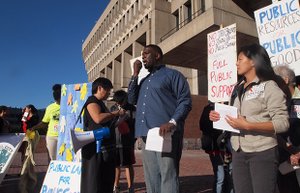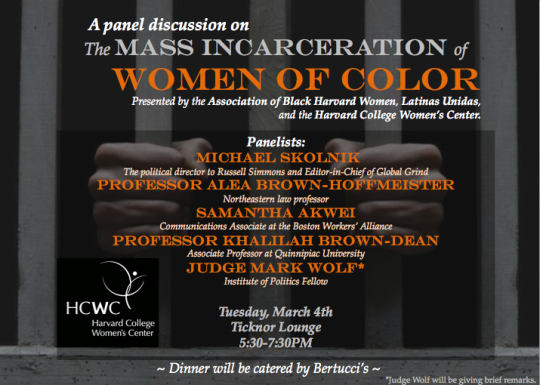
On the ninth floor of City Hall, Boston Redevelopment Authority board members were preparing to vote on a controversial plan to sell the air rights on Yawkey Way to the Boston Red Sox for $7.3 million, over the objections of the state’s inspector general.
Outside, on City Hall Plaza, a coalition of activist groups erected a cardboard rendering of the Millennium Partners skyscraper planned for the Filene’s department store site in protest of the BRA’s approval of $7.8 million in tax breaks for the planned retail, hotel and luxury condo development.
The city’s planning and development agency has come under increased scrutiny in recent weeks with the immanent departure of Boston Mayor Thomas Menino, sparking calls for more openness and transparency.
The protesters on City Hall Plaza, organized by the Right to the City Coalition, said the BRA’s tax breaks to developers are robbing the city of much-needed revenue.
“We’re always hearing that there’s no money for arts in schools, no money for libraries,” said Chinese Progressive Association Executive Director Lydia Lowe. “We should be putting that money back into education.”
As the city’s planning agency, the BRA has the power to sell public land and air rights and to grant lucrative tax breaks to developers. Lowe argues that the proceeds from tax breaks and the sale of public land should provide maximum benefit to the city’s residents.
“What we want to know is what’s been happening with our tax dollars,” she said. “What’s been happening with our public resources.”
While developers who build on public land are routinely required to set aside 15 percent of their units for affordable housing or pay into the city’s affordable housing trust fund, the proceeds from the sale of public land and air rights go directly to the BRA’s coffers, where they are not subject to public scrutiny.
“The BRA green-lights a lot of projects that don’t have the community’s interest at heart,” said Hakim Cunningham, director of labor and human rights organizing for the Greater Boston Workers Alliance. “A lot of development projects that the BRA approves have no community input, no community involvement.”
To illustrate the potential community benefits that could accrue from tax breaks awarded to developers, activists wrote down suggestions for public programs they would like to see funded on slips of paper, then pasted the paper onto the cardboard skyscraper. The action was designed to inject the issue of BRA reform into the public discourse as mayoral candidates City Councilor John Connolly and Mass. Rep. Marty Walsh enter the final six weeks of their campaigns.
“Both candidates are on record saying that the BRA needs to be reformed, they do need to be more transparent and accountable,” said Lisette Le, field coordinator for Right to the City. “We need to have deeper conversations with them about community control and how money that comes into the city is used in our community.”
Kalila Barnett, executive director of Alternatives for Community and Environment, says the Right to the City coalition members would like for the BRA to include community input into negotiating public land sales and tax breaks.
“We need community benefits agreements,” she said. “We have to radically rethink how we do planning and how we do development in our cities.”
Nowhere in the city are residents seeing the results of Boston’s luxury condo building boom more than in Chinatown, where low-income residents are being squeezed out by condo conversions and large new luxury highrises.
The $7.8 million tax break for the Millennium Partners building was announced a week before last week’s BRA meeting with no public process or comment. At last week’s meeting, the BRA board voted to approve the $7.3 million sale of Yawkey Way with the support of all but one of the board members — Timothy Burke, who is the sole member appointed by Gov. Deval Patrick.
Outside on City Hall plaza, the protesters said they would continue to fight for change.
“We don’t care who will be the next mayor; the BRA must change,” said Chinatown activist Jian Hua Tang, speaking through an interpreter. “This is our Boston. This is our community. And we have the right to remain, rebuild and reclaim our community.”




